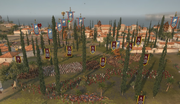The Battle of Laurion was a battle of the Peloponnesian War which was fought in 432 BC. The Spartan king Pleistoanax marched through Attica, bypassing Athens to attack the vital mining town of Lavrio. His army overwhelmed the Athenian garrison and captured the town, crippling the Athenian navy and posing a direct threat to Athens itself.
Background[]
At the start of the Peloponnesian War in 432 BC, it was Sparta's aim to cripple Athens on land to prevent its navy becoming too large. Since the mines at Laurion provided much of the city's income, and therefore its shipbuilding capabilities, their loss would be devastating. Once Laurion was captured, Athens would be the next target, as it was the key to dominance over all Greeks. King Pleistoanax led an army from Sparta through the territory of Argos and Corinth, having secured their allegiance as member states of the Peloponnesian League, before penetrating into the Athenian homeland of Attica itself. His army bypassed the undefended city of Athens, knowing that capturing such a major city would make them the Greek hegemon prematurely and cost them their diplomatic relations with their allies. Instead, his army marched to the southern tip of the Attica peninsula and attacked the garrison of Laurion, finding that it was defended by 1,200 troops from both land and sea.
Battle[]

The assault on Laurion
The Spartans drew up their battle lines immediately outside of the town, with the cavalry holding the right flank, the hoplites forming the main body, and the Spartan and mercenary Greek skirmishers screening them. When a group of Athenian hoplites came out to face them, they were showered with javelins and arrows and nearly annihilated, fleeing in terror back into the town. The main body of Spartan hoplites then charged into the town to fight back the Athenian garrison, while the Spartan cavalry charged around the town, through the coastal neighborhood, and then into the Athenian rear. The Athenians were then slaughtered, and the few survivors escaped on Perdikkas' ships (The Athenian admiral Thukydides had been slain during the battle). Laurion's capture enabled Pleistoanax to directly threaten Athens, but the Spartans never assaulted the city, even when it was undefended; instead, they settled in at Laurion, established bases on the peninsula (such as at the Mt. Pentelikos Marble Quarry), and began a lengthy land blockade against the city.
